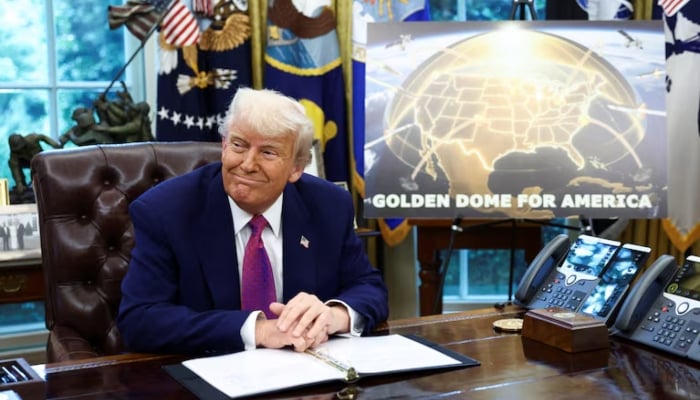Select Language:
President Donald Trump has revealed new information and initial funding for his ambitious “Golden Dome” global missile defense initiative, prompting China to accuse the U.S. of destabilizing global security on Wednesday.
During an announcement made on Tuesday, Trump allocated $25 billion to the project, estimating that the total cost could reach approximately $175 billion, with plans for the system to be operational within three years.
Beijing swiftly criticized the Golden Dome plan, labeling it a danger to international peace and asserting that the United States is sparking an arms race.
“I promised the American people I would develop a cutting-edge missile defense shield during my campaign,” Trump stated at the White House. “I’m thrilled to announce that we have finalized the architecture for this state-of-the-art system.”
“Once complete, the Golden Dome will intercept missiles launched from anywhere in the world, including outer space,” he added, emphasizing the importance of the system for the nation’s security.
Trump disclosed that U.S. Space Force General Michael Guetlein would oversee the effort, mentioning that Canada has expressed interest in collaborating, citing their need for protection as well.
While Trump estimated the total expenditure at around $175 billion, the Congressional Budget Office previously assessed that the cost of space-based interceptors designed to tackle a limited number of intercontinental ballistic missiles might range from $161 billion to $542 billion over 20 years.
The Golden Dome initiative aims for even broader objectives, with Trump stating it “will implement next-generation technologies across land, sea, and space, incorporating space-based sensors and interceptors.”
Pentagon chief Pete Hegseth, who joined Trump for the announcement, noted that the system aims to shield “the homeland from cruise missiles, ballistic missiles, hypersonic missiles, and drones, whether they are conventional or nuclear.”
China and Russia Oppose the Golden Dome
The name “Golden Dome” is inspired by Israel’s Iron Dome defense system, which has successfully intercepted thousands of short-range rockets and projectiles since its deployment in 2011.
The United States is facing missile threats from various adversaries, which differ significantly from the short-range munitions targeted by Israel’s Iron Dome.
The 2022 Missile Defense Review acknowledged increasing threats from China and Russia, highlighting that Beijing is catching up in ballistic and hypersonic missile technologies, while Moscow is modernizing its intercontinental missile systems and developing advanced precision strike capabilities.
The report also warned of the growing dangers posed by drones—evident in the conflict in Ukraine—and noted the potential threats of ballistic missiles from North Korea and Iran, as well as risks from non-state actors.
In response to the Golden Dome announcement, Beijing expressed “serious concerns,” indicating that it undermines “global strategic balance and stability.”
“The United States prioritizes its own interests and is obsessed with pursuing absolute security, violating the principle that one country’s security should not come at the expense of others,” remarked foreign ministry spokeswoman Mao Ning during a press briefing.
“This initiative increases the risk of space becoming a battlefield, sparks an arms race, and jeopardizes international security,” she continued.
Earlier this month, China joined Russia in denouncing the Golden Dome concept as “highly destabilizing.” A Kremlin statement following discussions between the two nations emphasized that it “explicitly calls for significantly enhancing military capabilities for space operations.”
In recent years, the United States has gained valuable experience in intercepting missiles and drones. For example, U.S. systems have effectively countered advanced Russian missile threats in Ukraine, while American aircraft and naval vessels aided Israel against Iranian assaults last year and have repeatedly intercepted missiles and drones targeting ships by Iran-backed Houthi rebels in Yemen.







